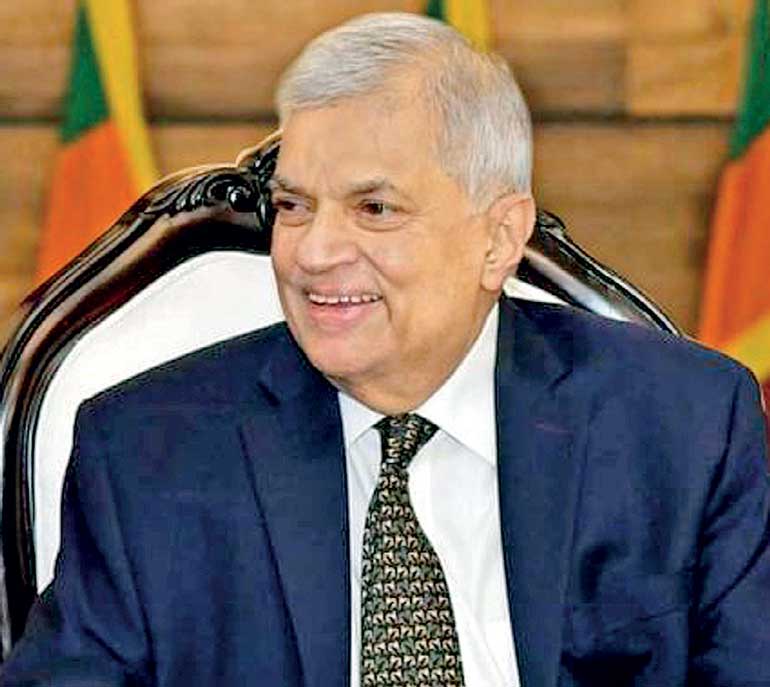Thursday Feb 19, 2026
Thursday Feb 19, 2026
Tuesday, 1 November 2022 00:00 - - {{hitsCtrl.values.hits}}

The current Government led by Ranil Wickremesinghe is using the same tools and strategies of its disgraced predecessor to try and appropriate and divide sections of the disgruntled public
Despite their constant reference to the open economy and the outside world, right-wing economists writing about Sri Lanka often seem surprisingly oblivious to the momentous changes that are now occurring in the global order.
It seems like many neoliberal experts want to return to the heady days of the 1980s, when the debt crisis caused by dollar borrowings, which increased in the aftermath of the 1970s energy crisis, exposed Southern countries to IMF-led shock therapy. The latter prioritised slashing State expenditure, with devastating consequences for inequality.
What we are now seeing today, however, is a breakdown in the hegemonic order, especially the relationships between the big powers that are supposed to keep the system running smoothly.
In this critical period when global uncertainty is increasing, the rallying cry of the economic establishment and its neoliberal vanguard is to keep insisting that there is no point in turning back the clock. Supposedly, the only way forward is through increased economic liberalisation, which is disguised by the mellifluous term “openness”.
The idea, however, that true openness can be achieved through more regressive “reforms”, or shock therapy, however, is a non-starter in the current moment. People are suffering. The economy will likely contract by around one-tenth this year alone.
For a country like Sri Lanka, in which many people were already living on the precipice before the crisis, this is an absolute disaster. But the old bogeyman of socialism has reappeared just in time as a convenient explanation. Supposedly, State-Owned Enterprises and their powerful trade union “mafias” have shackled productivity and made life more difficult for the common people.
Such knee-jerk claims betray a naïve understanding of the State. Specifically, the ways in which it has been overdetermined by the neoliberal system. If the Rajapaksas extended their patronage through the State, for example, by giving their supporters jobs, it was not to create a neo-socialist utopia.
Rather, it was to try and keep some people happy while pursuing their overriding project of greater financialisation to super-charge post-war growth with foreign debt borrowing and speculation, especially in urban real estate.
These two strategies are now in direct contradiction with each other; namely, the drive to increase public sector employment to cope with the structural lack of good jobs in the formal sector, and financialisation, which through its effects, including austerity and household indebtedness, has dispossessed many more. 
The tension must now be resolved in one of two ways. Either there is a push for the democratisation of the State – meaning, more public oversight, instead of selling State assets – and disciplining capital to meet working people’s needs. Or public assets are pillaged on a hitherto unprecedented scale in a process of what Marxist geographer David Harvey calls accumulation by dispossession, in the middle of Sri Lanka’s worst economic crisis since the 1930s.
To avoid the latter, we must be clear on the sources of the present crisis, rather than pretend that it was caused by excessive State spending. If the public sector is now on the chopping block, it is because of a structural crisis that has global ramifications due to the long downturn in the capitalist economy. This must be analysed critically, rather than viewing the collapse as an excuse to impose extreme, ideologically driven solutions on the unsuspecting public.
Rhetoric versus analysis
The irony is that the left is often accused of having a narrow, ideological agenda. But the most advanced theorists on the left are the ones who have historically attempted to clarify the connection between science and politics.
They have done so to try and avoid self-deception in the form of easy solutions that can invite severe repression from the State and dominant social forces. Meanwhile, authoritarian regimes find it useful to dissimulate their projects. This often leads them, however, to buy their own claims hook, line, and sinker, therefore taking hubristic actions, such as ignoring popular discontent.
In this regard, the current Government led by Ranil Wickremesinghe is using the same tools and strategies of its disgraced predecessor to try and appropriate and divide sections of the disgruntled public. For example, by throwing bones to elements of the Opposition like the most recent 22nd Amendment, without any real movement toward a General Election and a referendum to abolish the Executive Presidency.
But we must not view the Government’s policy proposals in isolation from each other, such as the recent proposed income tax increase, while ignoring its larger class project. In this regard, the Wickremesinghe Government is very clear on where it stands in terms of the divide between the haves and have nots. Its primary purpose has been to try and suppress the greatest people’s uprising in Sri Lanka in decades.
Meanwhile, for those establishment intellectuals who are eager to reassert their banal theories of the way in which Sri Lanka can succeed in a competitive global economy, we should also remind them that rhetoric does not constitute analysis. Repeating the line that the IMF is the only solution reminds one of the bureaucratic degeneration of the Soviet Union’s messaging into stale propaganda, in which claims about imminent victory in the Cold War were confused with reality.
Declaring that victory is on the horizon for Sri Lanka, if only workers can tighten their belts further and the State can be slashed to become more efficient, is pure delusion considering the degree to which the world around us is changing. And everyone else, even the staff of the IMF and World Bank, can see that identifying an appropriate solution is no easy exercise.
Already, the World Bank President has acknowledged, for example, that rapid interest rate increases in core countries are threatening to derail the development path of many countries in the global periphery. Of course, this type of mea culpa is rarely accompanied by an actual change in policy that could threaten the interests of powerful creditor countries.
Going backward to go forward
Nevertheless, the point is that when the established institutions fail, we need a concrete reckoning with our political and economic horizon. Or as Adam Tooze put it in a recent Op-ed in the Financial Times (UK), much in contrast to the worn-out tropes circulating among the Sri Lankan establishment: “If you have found the past few years stressful and disorientating, if your life has already been disrupted, it is time to brace. Our tightrope walk with no end is only going to become more precarious and nerve-racking.”
Despite claims that self-sufficiency is backward looking, a revived, critical understanding of this concept is the primary path forward in grappling with the tremendous challenges facing Sri Lanka.
John Maynard Keynes himself recognised the urgent need to consider such alternatives in his famous article written at the height of the Great Depression, “National Self-Sufficiency”. Keynes is now remembered for his own contributions to help establish the Bretton Woods institutions, the IMF and the International Bank for Reconstruction and Development (which eventually became the basis of the World Bank) after World War II.
But we must return to the original core of thinking that enabled even an establishment bourgeois intellectual like Keynes to recognise that the old way was no longer going to work in the middle of a major crisis of the capitalist order.
Moreover, we must recognise that ideas become activated through great, collective forces of change. To do justice to the people’s movement in Sri Lanka, it is not sufficient to echo uncritical ideas of the past. Cliched proposals are being repackaged for this moment, with cheerleading for the policy framework that in fact led Sri Lanka into the crisis.
The neoliberals, however, should not be let off the hook. From hollowing out the country’s revenue base through decades of tax concessions and “investor-friendly” policy, to promoting financialisation and capital market liberalisation, to the most recent disastrous decision to default, it is not socialism that has led Sri Lanka into the crisis.
And while the left, and the public sector for that matter, are often the easiest target for elites looking for someone to blame, we must remember that in times of crisis, policy experimentation is an absolute necessity.
If nothing else, it will be the Sri Lankan people’s utter refusal to comply with the latest round of shock therapy that will create the window of opportunity for the more self-aware intellectuals within the country’s establishment to finally come to terms with a simple fact: business as usual will not cut it.